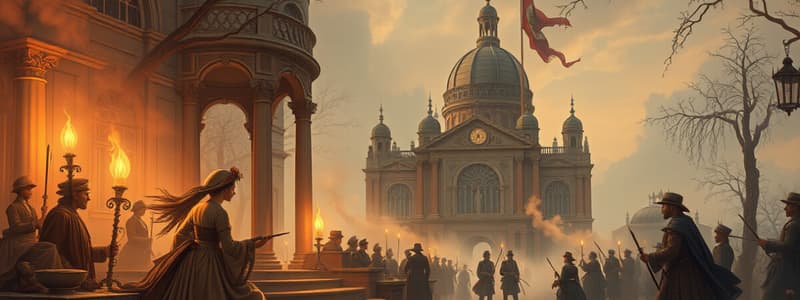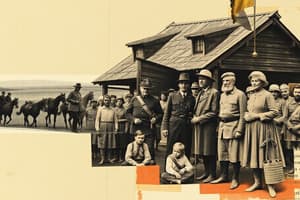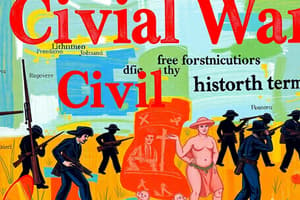Podcast
Questions and Answers
What were the differences between northern and southern states before the Civil War?
What were the differences between northern and southern states before the Civil War?
The North had a growing manufacturing economy with political changes and reform movements, while the South was primarily agricultural, focused on cotton in a plantation system.
What were the political differences between northern and southern states before the Civil War?
What were the political differences between northern and southern states before the Civil War?
Northerners generally supported a Bank of the United States, protective tariffs, federal internal improvements, and opposition to slavery in the territories, while Southerners disagreed.
What caused the Civil War?
What caused the Civil War?
The primary causes included arguments over federal vs. states' rights, control of the federal government, economic differences, and slavery, with slavery being seen by many historians as the main cause.
What did northerners think of slavery?
What did northerners think of slavery?
What did southerners think of slavery?
What did southerners think of slavery?
How were differences between the North and South settled before the 1850s?
How were differences between the North and South settled before the 1850s?
What effect did the Mexican-American War have on sectional differences?
What effect did the Mexican-American War have on sectional differences?
What was the Compromise of 1850?
What was the Compromise of 1850?
What effect did Uncle Tom's Cabin have on sectional differences?
What effect did Uncle Tom's Cabin have on sectional differences?
What was the Kansas-Nebraska Act?
What was the Kansas-Nebraska Act?
Why was the Republican Party created?
Why was the Republican Party created?
What was the Dred Scott decision?
What was the Dred Scott decision?
What were the Lincoln-Douglas Debates?
What were the Lincoln-Douglas Debates?
What happened at Harper's Ferry, Virginia in 1859?
What happened at Harper's Ferry, Virginia in 1859?
What happened in the election of 1860?
What happened in the election of 1860?
What is the significance of the Mexican Cession?
What is the significance of the Mexican Cession?
What was the Wilmot Proviso?
What was the Wilmot Proviso?
Who was Harriet Beecher Stowe?
Who was Harriet Beecher Stowe?
What triggered the birth of the Republican Party in 1854?
What triggered the birth of the Republican Party in 1854?
What were the arguments for southern secession?
What were the arguments for southern secession?
What was the Confederate States of America?
What was the Confederate States of America?
Who was Abraham Lincoln?
Who was Abraham Lincoln?
Who was William Lloyd Garrison?
Who was William Lloyd Garrison?
Who was Frederick Douglass?
Who was Frederick Douglass?
Who was Harriet Tubman?
Who was Harriet Tubman?
Who was Sojourner Truth?
Who was Sojourner Truth?
Who was John C. Calhoun?
Who was John C. Calhoun?
Who was Henry Clay?
Who was Henry Clay?
Who was Chief Justice Roger B. Taney?
Who was Chief Justice Roger B. Taney?
What does 'antebellum' mean?
What does 'antebellum' mean?
What does 'peculiar institution' refer to?
What does 'peculiar institution' refer to?
What was the Underground Railroad?
What was the Underground Railroad?
What was the Fugitive Slave Act?
What was the Fugitive Slave Act?
What was Bleeding Kansas?
What was Bleeding Kansas?
What is popular sovereignty?
What is popular sovereignty?
What was the Freeport Doctrine?
What was the Freeport Doctrine?
Flashcards are hidden until you start studying
Study Notes
Differences between North and South
- The North had a growing manufacturing economy and dynamic reform movements, while the South was predominantly agricultural, relying heavily on cotton plantations.
Political Discrepancies
- Northerners favored a Bank of the United States, protective tariffs, internal improvements, and the prohibition of slavery in territories; southerners opposed these ideas.
Causes of the Civil War
- Central issues included federal vs. states' rights, control of the federal government, economic differences, and the contentious topic of slavery.
- Slavery was a primary emotional issue driving separation between North and South, though some states remained in the Union despite slavery.
Northern Perspectives on Slavery
- While the abolitionist movement gained traction, most Northerners were indifferent to abolitionists before the 1850s. They viewed slavery as morally wrong but were not universally supportive of immediate abolition.
Southern Perspectives on Slavery
- Most southerners did not own slaves but supported the institution, arguing it was historically accepted, more humane compared to northern capitalism, and biblically sanctioned.
Compromise Before the 1850s
- Sectional differences were often reconciled through compromises like the Missouri Compromise of 1820 and the Compromise of 1833.
Impact of the Mexican-American War
- The war’s conclusion in 1848 heightened debates over slavery in newly acquired territories, making compromises over slave or free status increasingly contentious.
Compromise of 1850
- Included California as a free state, enacted strict Fugitive Slave Laws, abolished the slave trade in D.C., allowed popular sovereignty in New Mexico and Utah, reduced the Texas boundary, and addressed Texas debts.
Influence of Uncle Tom's Cabin
- Harriet Beecher Stowe’s novel galvanized anti-slavery sentiment in the North and incited anger in the South, highlighting the horrors of slavery.
Kansas-Nebraska Act
- Authored by Senator Stephen Douglas, it created governments in Kansas and Nebraska, repealed the Missouri Compromise, and established slavery decisions via popular sovereignty.
Formation of the Republican Party
- Established in 1854 after the Whig Party's division over slavery, the Republican Party opposed popular sovereignty and the extension of slavery into new territories.
Dred Scott Decision
- The Supreme Court ruled in Dred Scott v. Sandford (1857) that blacks were not citizens and that Congress could not restrict slavery in the territories, intensifying tensions.
Lincoln-Douglas Debates
- In 1858, debates between Abraham Lincoln and Stephen Douglas raised Lincoln's national profile despite losing the election; Douglas argued for popular sovereignty despite Congressional limits.
John Brown’s Raid
- In 1859, radical abolitionist John Brown attempted to initiate a slave revolt by raiding Harper's Ferry; his execution made him a martyr in the North and escalated Southern fears of a Northern conspiracy.
Election of 1860
- Abraham Lincoln became the 16th president with a minority of popular votes. His election prompted seven southern states to secede and form the Confederate States of America.
Mexican Cession
- Territory gained from Mexico post-war included Arizona, New Mexico, California, Utah, Nevada, and Colorado (Treaty of Guadalupe Hidalgo).
Wilmot Proviso
- Proposed in 1846 to prohibit slavery in Mexico's newly acquired territories, it ignited significant debates, leading to the rise of the Free Soil and Republican parties.
Harriet Beecher Stowe
- An influential figure in the abolitionist movement, her novel Uncle Tom's Cabin depicted the harsh realities of slavery, impacting public opinion in both the U.S. and U.K.
Birth of the Republican Party
- Formed in 1854 from various anti-slavery factions, it became a significant political force, with John C. Fremont as its first presidential candidate.
Southern Secession Justification
- Southerners claimed the Constitution allowed states to withdraw from the Union without consent, while the federal government deemed secession illegal.
Confederate States of America
- Established by eleven southern states that seceded from the Union, the Confederacy existed from 1861 to 1865, culminating in defeat during the Civil War.
Authority of Abraham Lincoln
- Lincoln rose from obscurity to significance as a Republican leader. He was a sectional president not included on Southern ballots during the 1860 election.
William Lloyd Garrison
- Founded "The Liberator," an anti-slavery newspaper advocating for immediate emancipation and the involvement of women in the abolitionist movement.
Frederick Douglass
- A former slave turned influential abolitionist and speaker, he published "Narrative of the Life of Frederick Douglass," exposing the brutalities of slavery.
Harriet Tubman
- An African-American abolitionist and Union spy, she led over 70 slaves to freedom via the Underground Railroad and supported John Brown’s raid efforts.
Sojourner Truth
- A freed slave and activist for abolition and women's rights, her famous speech "Ain't I a Woman?" highlighted the intersection of race and gender issues.
John C. Calhoun
- A prominent southern politician advocating for states' rights and the preservation of slavery; he called for quiet respect from the North regarding Southern demands.
Henry Clay
- A significant political figure known for his role in crafting the Compromise of 1850; viewed as the ideal Whig candidate but faced backlash due to his speeches.
Chief Justice Roger B. Taney
- Authored the Dred Scott ruling, reinforcing slave owners' rights and the legality of slavery's expansion.
Antebellum Context
- Refers to the period between 1830 and 1860, preceding the Civil War and characterized by rising tensions over slavery.
"Peculiar Institution" Definition
- The term used in the South to describe slavery, emphasizing its unique and historically rooted cultural significance.
Underground Railroad
- A network of safe houses facilitating the escape of enslaved individuals to free states; known for Harriet Tubman’s crucial role in its operations.
Fugitive Slave Act
- A controversial law part of the Compromise of 1850, penalizing those who aided escaped slaves and denying slaves the right to a fair trial.
Bleeding Kansas
- A violent struggle for control over Kansas between pro-slavery and anti-slavery factions from 1854 to 1857, exemplifying the sectional conflict.
Popular Sovereignty
- A principle allowing settlers in new territories to determine the status of slavery based on the 10th Amendment, leading to significant tensions.
Freeport Doctrine
- Introduced during the Lincoln-Douglas debates, suggesting that territories could choose to remain free despite Congressional decisions on slavery.
Studying That Suits You
Use AI to generate personalized quizzes and flashcards to suit your learning preferences.




